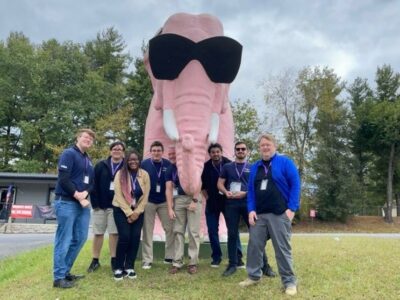Posted on November 1, 2023 by Rebekah Alegria
 Team members were Alex Bryant, a junior computer science major; Aditya Dindi, a sophomore cybersecurity major; Logan Goins, a freshman cybersecurity major; Alexis Obeng, a sophomore computer science major; Julian Peña, a freshman computer science major; and Jacob Rahimi, a senior computer science major and team captain.
Team members were Alex Bryant, a junior computer science major; Aditya Dindi, a sophomore cybersecurity major; Logan Goins, a freshman cybersecurity major; Alexis Obeng, a sophomore computer science major; Julian Peña, a freshman computer science major; and Jacob Rahimi, a senior computer science major and team captain.
“Cybersecurity is a growing field, and our team worked together to advance us to this level. You can be the best hacker on the planet, but if you cannot communicate clearly with your team, you won’t get far. That is one of the biggest things that helped us win the competition,” stated Dindi.
Team alternates were Aidan Kollar, a junior computer science major; and Brandon Hawkins, a senior computer science major. Faculty coaches were John Newsom and Benjamin Anderson, both of whom are assistant professors of practice in the college’s Department of Information Systems and Cyber Security.
“The CPTC Competition is an especially grueling competition because of the schedule and tasks students are given to compete,” said Anderson. “The team worked hard to clench the first place spot this year, and they are excited to compete in the global finals this January.”
CPTC focuses on training and evaluating teams on the types of real-world activities that they might perform during a real penetration testing assignment. Students are given eight hours to conduct assessment and penetration testing. Then, that same day they have seven hours to write a report outlining their findings. Their reports and other activities are graded by industry professionals.
“Learning the theory and technical skills regarding offensive security is one thing, but actually performing it in a professional environment was an invaluable experience,” said Goins.
With more than 100 schools competing across seven global regions, the competition focuses on three competency areas that are of particular relevance in business: technical knowledge, communication skills and collaboration.

